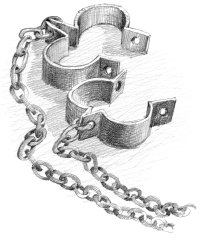THE WORD IS |
 Luke 23:43 "To day shalt thou be with me in paradise." Finland's form of government gives the President, according to his discretion, the right to pardon a criminal. Every now and then we hear that the President has exercised this right. God also pardons. To better understand God's pardon we will compare it to the President's pardon. When the President pardons, the condemned person does not have to suffer the punishment that the law prescribes for him. This does not mean that the verdict of the court is revoked or changed. As far as the law is concerned the convicted one still deserves the punishment. A presidential pardon means that the punishment which the wrongdoer has deserved according to the law is not carried out. The President can pardon only after the Supreme Court has rendered its opinion concerning the case, even though he is not bound by this opinion. When God pardons us, He too is dealing with those who are guilty ? those who have deserved punishment according to the Law. God also frees us from the punishment we have deserved. When the President pardons, the punishment is not suffered at all. But when God pardons, He remains a God who does not modify the demands of the Law. The cup of God's wrath had to be drained to the last drop. This was done by Christ in our behalf. "...without shedding of blood there is no forgiveness" (Heb. 9:22). God pardoned us by sending His own Son into the world, who as our Substitute suffered the punishment for our sins. The President pardons without a real basis for his pardon. The crime remains unexpiated. God pardons on the basis of Christ's words: "It is finished!" (John 19:30). Everything has already been done in our behalf, once and for all! The President undoubtedly seeks to find some justification for his pardon, although according to the law he cannot proclaim the guilty one innocent. God also examines us. "The Lord has looked down from heaven upon the sons of men, to see if there are any who understand, who seek after God" (Ps. 14:2). But what does God find? "They have all turned aside; together they have become corrupt; there is no one who does good, not even one" (Ps. 14:3). He finds no basis for pardoning us. Even the fact that He created us is not a valid basis, because He created people holy but they fell from this state of holiness through their own fault. The basis for God's pardon is in His heart, in His love. "But God demonstrates His own love toward us, in that while we were yet sinners, Christ died for us" (Rom. 8:5). In society when a criminal, or someone else in his behalf, pleads for mercy from the President, he cannot be sure of the results. He must wait for the decision in a state of uncertainty. The matter progresses like this: first the plea, then the decision. When we ask God to forgive us our sins, we do not have to be uncertain about the result. God has already pardoned us. We can ask for forgiveness every day on the basis of a pardon that has already been granted. God had pardoned us already even before we knew about asking for a pardon. Now we pray because God is already merciful - not in order that He would become merciful. The progression in God's Kingdom is this: first, grace; then, our prayers. A plea for mercy may move a president to grant a pardon. Our prayers do not move God to pardon. This has already been accomplished by Christ's sacrifice and by His prayers in our behalf. The President needs an opinion from the Supreme Court. God does not need an opinion from anyone. The President is bound by the law. God is above everything, free to do as He pleases. When the President pardons a criminal, the people may protest if they don't approve of the pardon. When God pardons, no one has the right to criticize His pardon. By nature, of course, we are such that we would not have a great sinner repent and believe his sins forgiven in Jesus' blood. Despite the opinion of the world, everyone has the right ? not for his own sake, but for the sake of God's name - to receive forgiveness for his sins through faith in Christ. Unfortunately many reject God's pardoning grace. The enormity of one's debt of sin does not nullify grace, rather "where sin increased, grace abounded all the more" (Rom. 5:20). The President can hardly grant pardons very often. By doing so he would weaken the inner strength of the nation and respect for the law. God's Kingdom is altogether different. God can pardon seventy times seven times, limitlessly, repeatedly, continuously. One would think that this would mean the collapse of everything and victory for evil. It's true that the Apostles lamented the fact that some misused grace and used the freedom of the Gospel as a license for evil. But it wasn't grace that brought this about, but rather the fact that grace wasn't accepted in faith. The Apostle Paul tells us what follows when grace is used in the right way: "For the grace of God has appeared, bringing salvation to all men, instructing us to deny ungodliness and worldly desires and to live sensibly, righteously and godly in the present age" (Titus 2:11,12). |



